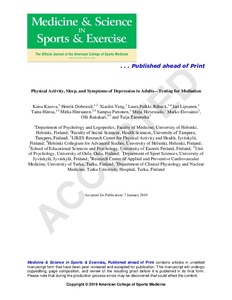Physical Activity, Sleep, and Symptoms of Depression in Adults-Testing for Mediation
Kaisa Kaseva; Henrik Dobewall; Xiaolin Yang; Laura Pulkki-Råback; Jari Lipsanen; Taina Hintsa; Mirka Hintsanen; Sampsa Puttonen; Mirja Hirvensalo; Marko Elovainio; Olli Raitakari; Tuija Tammelin
https://urn.fi/URN:NBN:fi-fe2021042824923
Tiivistelmä
Purpose: Physical activity, sleep problems, and symptoms of depression contribute to overall well-being. The factors are reciprocally associated, but the nature of these associations remains unclear. The present study examined whether sleep problems mediated the association between physical activity and depressive symptoms.
Methods: The eligible population (n = 3596) consisted of adults from the ongoing, population-based Cardiovascular Risk in Young Finns Study started in 1980. Participants' leisure-time physical activity was assessed with physical activity index (2007) and sleep problems with Jenkins' Sleep Questionnaire in 2007 and 2011. Depressive symptoms were measured using modified Beck Depression Inventory in 2007 and 2012, from which the items reflecting sleep problems were excluded. Mediation analyses, through which the associations between the variables were examined, were adjusted for sex and a set of health-related covariates assessed in 2007 and 2011.
Results: Physical activity was associated with decreased levels of sleep problems and depressive symptoms (P < 0.05). The association between physical activity and depressive symptoms (b = -0.10, P < 0.01) was partly mediated by sleep problems (proportion mediated = 0.36, P < 0.01). The adjustment for depressive symptoms at baseline attenuated the mediation effect (proportion mediated = 0.30, P > 0.05).
Conclusions: Physical activity's favorable contribution to depressive symptoms was mediated partly by sleep, but the mediation effect disappeared after adjusting for the previous depressive symptoms in adulthood.
Kokoelmat
- Rinnakkaistallenteet [29335]
